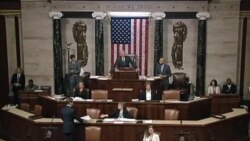WASHINGTON —
Public opinion polls suggest that congressional Republicans will get most of the political blame in the wake of the partial shutdown of the U.S. government. The data also shows that Americans are growing tired of what they see as crippling political polarization and dysfunction coming from both major parties.
As the government shutdown began to take effect in Washington, President Barack Obama said Republicans were responsible - because they will not give up their fight to undermine his signature health care law.
“They have shut down the government over an ideological crusade to deny affordable health insurance to millions of Americans. In other words, they demanded ransom just for doing their job,” said Obama.
Republicans, of course, have a different view - including House Speaker John Boehner who says congressional Democrats should be willing to negotiate a way to reopen the government.
“The only way these problems are going to be resolved is if we sit down amicably and keep the American people in mind and come to an agreement,” said Boehner.
The political chaos in Washington over funding the federal government seems to be stirring the public, says Quinnipiac pollster Peter Brown.
“Americans don’t like shutting down the government. Even Americans who don’t like Obamacare don’t like shutting down the government,” says Brown.
Brown’s latest poll found that 72 percent of Americans oppose the government shutdown and a growing number put most of the blame on Republicans in Congress.
“Politics is a zero-sum game. If it’s good for one side, it’s bad for the other, and right now it’s bad for the Republicans and good for the Democrats,” says Brown.
But Brown and other analysts see a deeper, more troubling impact of the political dysfunction in Washington.
Americans seem to be losing faith in the ability of the political parties and the government to function, says analyst Charlie Cook.
“They may end up blaming Republicans more than Democrats and more than the president. But historically when you have these kinds of showdowns everybody looks bad,” says Cook.
U.S. voters are already cynical. And Peter Brown says a lengthy government shutdown would lead to even greater disillusion among the public.
“The government can’t seem to get done what they think needs to get done. Whether they are for or against this program or that, they would like to see something positive come out of Washington. And in their view they are not seeing it.”
Brown adds that frustration will likely grow as the shutdown continues.
As the government shutdown began to take effect in Washington, President Barack Obama said Republicans were responsible - because they will not give up their fight to undermine his signature health care law.
“They have shut down the government over an ideological crusade to deny affordable health insurance to millions of Americans. In other words, they demanded ransom just for doing their job,” said Obama.
Republicans, of course, have a different view - including House Speaker John Boehner who says congressional Democrats should be willing to negotiate a way to reopen the government.
“The only way these problems are going to be resolved is if we sit down amicably and keep the American people in mind and come to an agreement,” said Boehner.
The political chaos in Washington over funding the federal government seems to be stirring the public, says Quinnipiac pollster Peter Brown.
“Americans don’t like shutting down the government. Even Americans who don’t like Obamacare don’t like shutting down the government,” says Brown.
Brown’s latest poll found that 72 percent of Americans oppose the government shutdown and a growing number put most of the blame on Republicans in Congress.
“Politics is a zero-sum game. If it’s good for one side, it’s bad for the other, and right now it’s bad for the Republicans and good for the Democrats,” says Brown.
But Brown and other analysts see a deeper, more troubling impact of the political dysfunction in Washington.
Americans seem to be losing faith in the ability of the political parties and the government to function, says analyst Charlie Cook.
“They may end up blaming Republicans more than Democrats and more than the president. But historically when you have these kinds of showdowns everybody looks bad,” says Cook.
U.S. voters are already cynical. And Peter Brown says a lengthy government shutdown would lead to even greater disillusion among the public.
“The government can’t seem to get done what they think needs to get done. Whether they are for or against this program or that, they would like to see something positive come out of Washington. And in their view they are not seeing it.”
Brown adds that frustration will likely grow as the shutdown continues.






